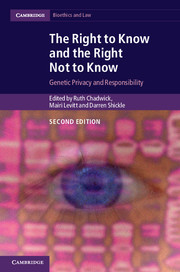Book contents
- Frontmatter
- Contents
- List of contributors
- Acknowledgements
- Introduction
- Part I Philosophical and legal issues
- Part II Issues in genetics
- Part III Emerging issues
- 9 The right to know and the right not to know in the era of neoliberal biopolitics and bioeconomy
- 10 The parental love argument against ‘designing’ babies: the harm in knowing that one has been selected or enhanced
- 11 The press and the public interest
- 12 The inescapability of knowing and inability to not know in the digital society
- 13 The food we eat: the right to be informed and the duty to inform
- Index
- References
10 - The parental love argument against ‘designing’ babies: the harm in knowing that one has been selected or enhanced
Published online by Cambridge University Press: 05 September 2014
- Frontmatter
- Contents
- List of contributors
- Acknowledgements
- Introduction
- Part I Philosophical and legal issues
- Part II Issues in genetics
- Part III Emerging issues
- 9 The right to know and the right not to know in the era of neoliberal biopolitics and bioeconomy
- 10 The parental love argument against ‘designing’ babies: the harm in knowing that one has been selected or enhanced
- 11 The press and the public interest
- 12 The inescapability of knowing and inability to not know in the digital society
- 13 The food we eat: the right to be informed and the duty to inform
- Index
- References
Summary
In this chapter, I argue that children who were selected for particular traits or genetically enhanced might feel, for this reason, less securely, spontaneously and fairly loved by their parents, which would constitute significant harm. ‘Parents’ refers, throughout this chapter, to the people who perform the social function of rearing children, rather than to procreators. I rely on an understanding of adequate parental love which includes several characteristics: parents should not make children feel they are loved conditionally, for features such as intelligence, looks or temperament; they should not burden children with parental expectations concerning particular achievements of the child; and parental love is often expressed in spontaneous enjoyment and discovery of children’s features. This understanding of parental love provides a reason to question the legitimacy of parental use of selection and enhancement and to explain why parents should not engage on a quest for the ‘best child’.
Introduction
Is there anything morally objectionable about parents trying, with the help of genetic technology, to ensure that their children will have features that are usually regarded as advantageous, such as good looks, exceptional cognitive abilities or sunny temperaments? Given that parents cannot but shape their children in a variety of ways – through deciding on diets, socialisation, education, use of free time and so on – what, if anything, speaks against a parental decision to select or to enhance their future children in medically and morally irrelevant ways?
Information
- Type
- Chapter
- Information
- The Right to Know and the Right Not to KnowGenetic Privacy and Responsibility, pp. 151 - 164Publisher: Cambridge University PressPrint publication year: 2014
References
Accessibility standard: Unknown
- 3
- Cited by
